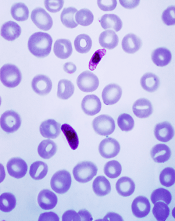User login
A human antibody can protect mice from infection with the malaria parasite Plasmodium falciparum, according to research published in Nature Medicine.
Researchers isolated the antibody, CIS43, from the blood of a volunteer who had received the PfSPZ Vaccine (Sanaria Inc.), an experimental vaccine made from whole, weakened malaria parasites.
The volunteer was later exposed to infectious malaria-carrying mosquitoes under carefully controlled conditions and did not become infected.
Researchers tested CIS43 in 2 different mouse models and found the antibody provided “high-level” protection from malaria infection.
In fact, CIS43 protects against malaria better than any antibody that has been described before, according to study author Marie Pancera, PhD, of Fred Hutchinson Cancer Research Center in Seattle, Washington.
She and her colleagues found that CIS43 works by binding to an epitope located between the N terminus and central repeat domains of PfCP (P falciparum circumsporozoite protein).
This epitope is conserved across 99.8% of all known P falciparum strains, which, according to the researchers, makes it an attractive target for next-generation vaccines designed to elicit production of CIS43.
Researchers at the National Institute of Allergy and Infectious Diseases Vaccine Research Center are planning to conduct clinical trials of CIS43 next year.
A human antibody can protect mice from infection with the malaria parasite Plasmodium falciparum, according to research published in Nature Medicine.
Researchers isolated the antibody, CIS43, from the blood of a volunteer who had received the PfSPZ Vaccine (Sanaria Inc.), an experimental vaccine made from whole, weakened malaria parasites.
The volunteer was later exposed to infectious malaria-carrying mosquitoes under carefully controlled conditions and did not become infected.
Researchers tested CIS43 in 2 different mouse models and found the antibody provided “high-level” protection from malaria infection.
In fact, CIS43 protects against malaria better than any antibody that has been described before, according to study author Marie Pancera, PhD, of Fred Hutchinson Cancer Research Center in Seattle, Washington.
She and her colleagues found that CIS43 works by binding to an epitope located between the N terminus and central repeat domains of PfCP (P falciparum circumsporozoite protein).
This epitope is conserved across 99.8% of all known P falciparum strains, which, according to the researchers, makes it an attractive target for next-generation vaccines designed to elicit production of CIS43.
Researchers at the National Institute of Allergy and Infectious Diseases Vaccine Research Center are planning to conduct clinical trials of CIS43 next year.
A human antibody can protect mice from infection with the malaria parasite Plasmodium falciparum, according to research published in Nature Medicine.
Researchers isolated the antibody, CIS43, from the blood of a volunteer who had received the PfSPZ Vaccine (Sanaria Inc.), an experimental vaccine made from whole, weakened malaria parasites.
The volunteer was later exposed to infectious malaria-carrying mosquitoes under carefully controlled conditions and did not become infected.
Researchers tested CIS43 in 2 different mouse models and found the antibody provided “high-level” protection from malaria infection.
In fact, CIS43 protects against malaria better than any antibody that has been described before, according to study author Marie Pancera, PhD, of Fred Hutchinson Cancer Research Center in Seattle, Washington.
She and her colleagues found that CIS43 works by binding to an epitope located between the N terminus and central repeat domains of PfCP (P falciparum circumsporozoite protein).
This epitope is conserved across 99.8% of all known P falciparum strains, which, according to the researchers, makes it an attractive target for next-generation vaccines designed to elicit production of CIS43.
Researchers at the National Institute of Allergy and Infectious Diseases Vaccine Research Center are planning to conduct clinical trials of CIS43 next year.

